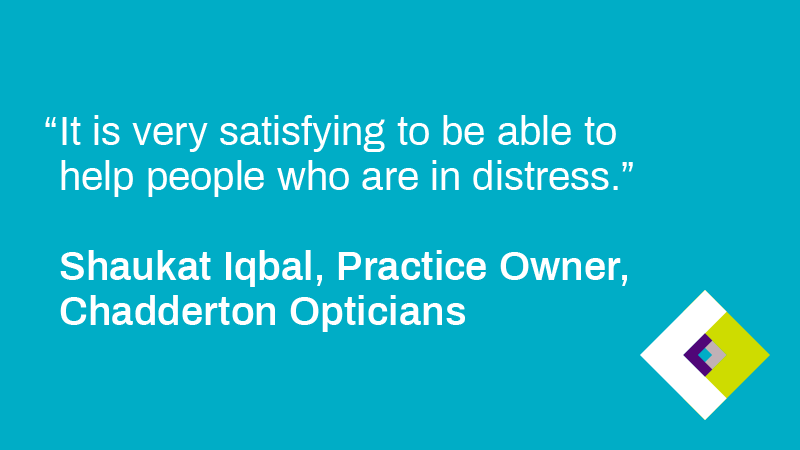CUES in action: rising to the challenge of COVID-19 in Oldham
26 June 2020

Reduced access to services in primary care optical practices and severe limitations on access to hospital ophthalmology services caused by COVID-19 created a critical need for a service for the many thousands of patients who suffered eye emergencies. The Covid-19 Urgent Eyecare Service (CUES) was developed to meet this need and the first service was commissioned in Oldham, going live in early May. We caught up with Wendy Craven, Vice-Chair of Greater Manchester East LOC, to find out how they managed to take a service from initial CCG conversation to signed contract and launch to practices in just five weeks. We also talked to practitioner Shaukat Iqbal, who has been delivering CUES to patients in Oldham…
Setting up a service from scratch
Prior to COVID-19 it could take a year or more from initiating discussions with the CCG to the launch of a service, but the urgency of the situation, and some incredibly hard work from all parties involved, saw four services set up in just over one month. Two of these were in areas where there were no previously commissioned services; this was the case in Oldham.
Greater Manchester East LOC was already in talks with commissioners to put a some new commissioned eye services in place before the pandemic struck and the relationships already in place became invaluable, as Wendy explains: “We had support from the beginning from Pennine Acute Hospitals NHS Trust, which was keen to achieve consistency across the four regions that refer patients to its hospitals. Matt Jinkinson, Chair of Greater Manchester Local Eye Health Network was another key partner and we worked closely with commissioner Yvonne Bagguley.”
The launch of the newly commissioned service to practices took place on Tuesday 5 May with around twenty practitioners attending an MS Teams meeting. All the launch packs were issued by Primary Eyecare Services (PES), as the delivery partner, and practitioners were issued with these before the event. They were asked to submit any questions in advance and there was also an open floor during the meeting for further queries.
Wendy explains how the service was presented along with PES colleague Rebecca Rietdyke: “We first presented how the new service would run and the pathways and protocols practices would need to follow. Rebecca then presented five different patient case scenarios and showed how they aligned with the CUES triage approach, explaining when referrals would take place and where patients would be referred to.” This approach helped practitioners quickly to familiarise themselves with the service and how it would work in practical terms.
As follow-up support, a WhatsApp group was set up for participating practices, so they could share experiences and information.
CUES in practice
One of the practitioners helping deliver CUES in Oldham is Shaukat Iqbal, practice owner at Chadderton Opticians. He was pleased to see a service in place: “We had been keen to offer MECS because we felt we weren’t really exercising our role with maximum potential, so when CUES came into existence we jumped at it.”
Since the service started, Shaukat has been “inundated” with patients, clearly showing how important the service is: “We receive an average of four calls a day,” he says. “I would say there is a 60-40% split between patients who are registered with the practice already and those who are not.”
One new patient who was immensely grateful for CUES is Oldham resident Helen Greenhalgh, who suffered an eye injury in late May. Helen’s partner has asthma and her father is undergoing cancer treatment, so she was reluctant to attend A&E and potentially increase their COVID-19 risk. After contacting 111 and having a GP consultation, she was directed to CUES and contacted Chadderton Opticians.
Helen had a virtual consultation with Shaukat over WhatsApp video, during which he took a close-up photo of her injury. “It was clear that she was in some distress and pain, with the eye watering profusely,” recalls Shaukat “there was damage to her cornea, so I advised her to keep the eye closed and to obtain antibiotic cream and lubricant drops from the pharmacist to prevent infection and assist healing.”
Shaukat followed the consultation with a text message reiterating his advice and explaining what Helen should ask for at the pharmacist. Helen found this useful: “The text message was very helpful as I could read it to the pharmacist, so they knew exactly what I needed,” she says.
After a few days, Shaukat checked back in with Helen to find that her eye was healing. “She was very grateful that she hadn’t needed to attend A&E and could still access expert assistance specific to her injury,” says Shaukat.
Overall, Shaukat says delivering CUES is very rewarding: “It is very satisfying to be able to help people who are in distress – it feels as though we are exercising our expertise and giving something back to the profession.”
Catalyst for stronger connections
From the commissioning perspective, Wendy believes that new virtual meeting practices could facilitate quicker rollout of services in future. “It was previously very difficult to get all the parties in a room on a regular basis, due to the different cycles on which each group worked. There is now a weekly meeting across the North-east sector CCGs in Greater Manchester, including the hospital. It gets everyone in a virtual room, which is so hard to achieve in person.”
Richard Whittington, LOCSU CEO, believes there is a lot to be learned from the way processes have been streamlined as a result of COVID-19: “There’s no doubt that incredible hard work from a huge number of people helped get CUES in operation across the country, and the urgency opened up avenues that have previously been rarely used; virtual meetings are one example. We will aim to learn from the experience and identify which efficiencies we can continue in future.”
CUES is now in place in: Oldham; Bolton; Manchester; Trafford; Bury; Bath and North East Somerset, Swindon and Wiltshire; Gloucestershire; Norfolk & Waveney; South West London; Hereford & Worcestershire; Heywood, Middleton & Rochdale.

